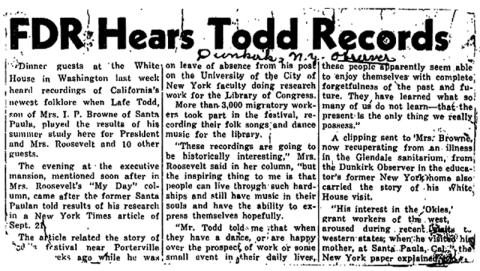
Description
A federal study found that the migrants were spending all they earned on gasoline and housing, with nothing left to feed themselves or their children. The Roosevelt administration answered this by setting up camps to house migrants. The large number of workers resulted in low wages, which led to a series of strikes such as the 1939 Madera Cotton Strike. In 1941, ethnographers Charles L. Todd and Robert Sonkin documented the lives of migrant workers in California, recording songs, stories, poetry and camp meetings. The New York Observer article reports that some of the songs recorded in California by Todd and Sonkin were presented at the White House at a dinner party. First Lady Eleanor Roosevelt said, "These recordings are going to be historically interesting, but the inspiring thing to me is that people can live through such hardships and still have music in their souls and have the ability to express themselves hopefully."
Transcript of "FDR Hears Todd Records" Newspaper Article
Source-Dependent Questions
- Why were migrant workers, "Okies," (a native or inhabitant of Oklahoma) living in the present, rather than the past or the future?
- Why do you think more than 3,000 migratory workers wanted to record their folk songs and dance music for the Library of Congress?
Citation Information
"FDR Hears Todd Records," New York Observer, between 1940 and 1941. Courtesy of Library of Congress